The three-part election process to select a local government in Indian-administered Kashmir commenced early on Wednesday, marking the first such electoral exercise since the region lost its special status five years ago. Security measures were intensified with the deployment of thousands of additional police and paramilitary forces in the seven southern districts where more than 2.3 million residents are eligible to vote for 24 lawmakers out of 219 candidates in the initial phase of polling.
Troops equipped with riot gear and firearms were stationed at checkpoints and patrolled the constituencies as locals queued up in villages and towns to participate in the voting process. The subsequent phases are scheduled for September 25 and October 1, with the staggered approach intended to facilitate movement of troops to prevent potential unrest. Vote counting is slated for October 8, with results anticipated later that same day.
In an unprecedented move, international media access to polling stations was restricted, and press credentials for the majority of journalists working with foreign media outlets, including The Associated Press, were denied without explanation. This election is the first in ten years and the initial one following the 2019 decision by Prime Minister Narendra Modi’s government to revoke the region’s semi-autonomous status, transforming it into a federally governed territory and splitting it into two separate territories, Ladakh and Jammu-Kashmir, directly administered by New Delhi.
India and Pakistan have conflicting territorial claims over Kashmir, with each administering a portion of the region. Militancy against Indian rule has been ongoing in the Indian-controlled territory since 1989, with most Muslim Kashmiris supporting the insurgents’ objective of reunification under Pakistani governance or as an independent nation. While India alleges Pakistan’s backing of terrorism in Kashmir, Pakistan refutes the accusation, asserting that Kashmiris are engaged in a legitimate struggle for freedom. The conflict has resulted in the deaths of tens of thousands of civilians, militants, and government forces over the years.
